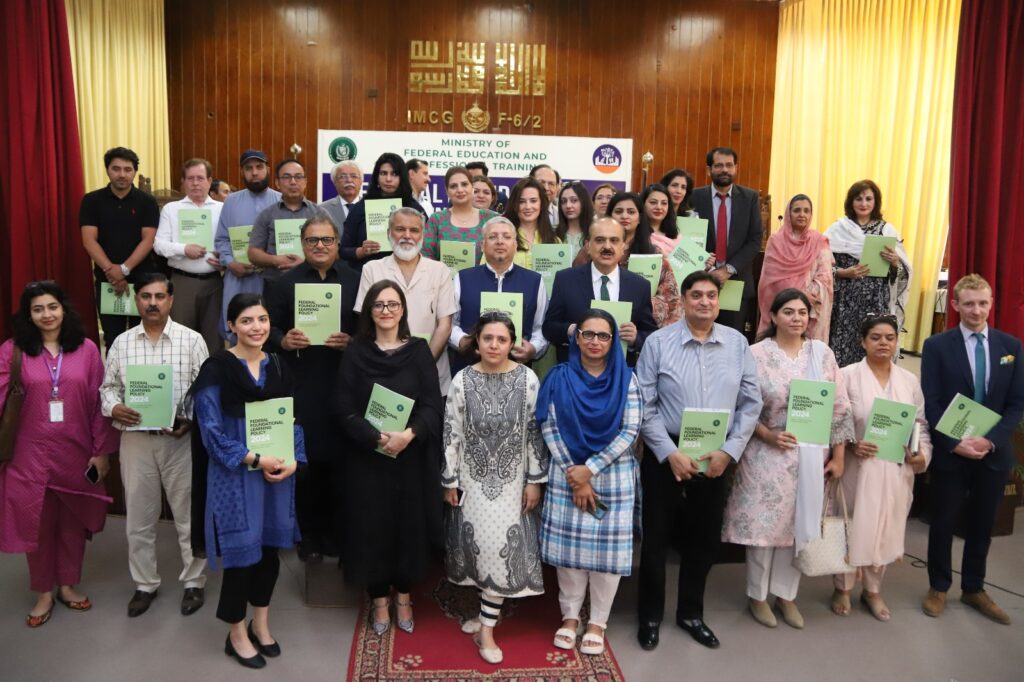
Islamabad: The Ministry of Federal Education & Professional Training (MoFEPT) launched the first ever Federal Foundational Learning Policy. The event was led by the Federal Secretary Mr. Mohyuddin Wani, and attended by key development partners, university vice-chancellors, parliamentarians and partner organisations working on education in Pakistan. The event was hosted by acclaimed author and social activist, Ms. Feryal Ali Gauhar.
On the 8th of May, 2024, the honourable Prime Minister, Shehbaz Sharif declared an education emergency. As a matter of urgency, the government will now address the out-of-school-children crisis – 26.2 million children are currently out of school. It will also address the learning crisis; in Pakistan, 4 out of 5 children cannot read with comprehension by the age of 10. Also, according to the recently launched Annual Status of Education Report 2023, only 13% of grade 3 children can do simple division. This means that children lack foundational skills. It means that they need to learn more complex concepts, and they are also less likely to become productive citizens. This policy is a crucial step in the government’s response to tackle the learning crisis.
The Federal Foundational Learning Policy 2024 aims to ensure that by “2030, all children enrolled in schools under the federal territories will acquire foundational learning skills”. The policy will apply to all government schools, private schools, non-formal education centres, and madaris in Islamabad Capital Territory, Gilgit Baltistan, and Azad Jammu and Kashmir. The departments responsible for policy implementation are the Federal Directorate of Education, School Education Department, Gilgit Baltistan and the Elementary & Secondary Education Department, Azad Jammu and Kashmir. Alongside these, a range of other departments will support the implementation of this policy, including the MoFEPT’s Pakistan Foundational Learning Hub, set up to drive improvements in early grade literacy and numeracy nationwide.
This policy is part of a national movement to improve basic reading and numeracy skills for Pakistan’s children. Across the country, each province is in the process of developing their own foundational learning policies. Alongside this, there is growing support from civil society, academia, and international organisations to tackle this issue.
At the launch on Monday, Mr, Salman Naveed Khan, CEO, Pak Alliance for Maths and Science, gave an overview of the eight pillars of the Federal Foundational Learning Policy 2024. Mr Sam Wilson, Project Director, Pakistan Foundational Learning Hub, said “it is easy to make a policy, but the real task is to implement it”. Ms. Rifat Jabeen, Director Academics, Federal Directorate of Education, talked about the success of the Reading Hour programme implemented in Islamabad Capital Territory, and commended the ongoing efforts of the MoFEPT to improve reading and create a reading culture in schools. Ms. Inga Afanasieva, Senior Economist at the World Bank, highlighted the low learning levels amongst children in ICT, and the low content knowledge of teachers who sometimes scored lower than their students on assessments. Ms. Saima Anwer, Senior Education Advisor at FCDO, stressed on the need to improve the quality of learning in schools in order to increase retention and tackle the out of school children crisis.
Finally, the Secretary MoFEPT, Mr. Mohyuddin Wani concluded the event by thanking partners and colleagues working on improving foundational learning in Pakistan. He highlighted the need to support teachers because of their key role in the learning process. He also nominated Ms. Feryal Ali Gauhar as the reading envoy to create a reading culture in the federal areas.
“InshaAllah we will implement the policy in its true letter and spirit, and engage all the stakeholders and customise it according to each area.”
Mr. Moyuddin Wani, Secretary, MoFEPT